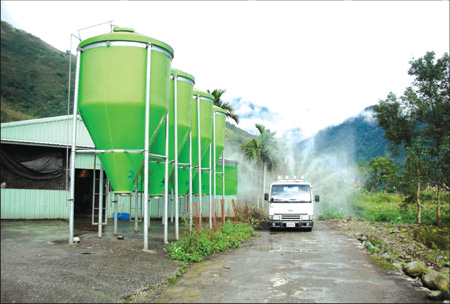Taitung has first cases of A(H1N1) infection in hogs
Updated: 2009-11-06 08:18
(HK Edition)
|
|||||||
|
A duster truck sprays disinfectant over the premises of a pig farm in Hualian County, eastern Taiwan yesterday, after authorities confirmed an outbreak of the A(H1N1) swine flu among hogs at several farms in neighboring Taitung County earlier this month.CNA |
TAIPEI: Hogs in Taitung have tested positive for the influenza A(H1N1) virus - the first time pigs have been diagnosed with this strain of flu in Taiwan, Centers for Disease Control (CDC) Director Steve H.S. Kuo confirmed yesterday.
Kuo said the virus, also known as human swine flu, was found in three animals being raised on a farm in the southeastern county of Taitung after they were destroyed.
The Taitung County Livestock Disease Control Center began conducting tests on pigs October 27 after being informed that about 160 out of some 3,000 animals raised on the farm had begun showing symptoms of cough, runny nose and diarrhea from about 10 days earlier.
The virus was confirmed to be the same as the new H1N1 strain that affects humans, according to Kuo.
The livestock disease control center immediately took measures to contain the spread of the virus and began an investigation into the health of workers on the farm to establish the origin of the virus, Kuo said.
Meanwhile, Huang Jin-cheng, chief of the Animal Health Research Institute under the Council of Agriculture, said at a press conference that according to initial checks, the virus is believed to have passed from an infected person to a pig, then spread throughout the pig herd.
Huang noted that as the swine flu virus is not transmitted by food, people will not get swine flu from eating pork or pork products. Eating properly handled and cooked pork and pork products is safe, he stressed.
To date, pig herds in Canada, Argentina, Australia, Britain, Ireland, Norway, Japan and Iceland have also reported the presence of swine flu, according to Huang.
Hsu Tien-lai, director of the COA's Department of Animal Industry, also said the infected pigs will not be given medication because they will normally recover from the flu in three to seven days.
So far, there has been no evidence that these animals will transmit swine flu to humans and there has been no mutation of the virus, Hsu added.
The infections have put pig farmers on high alert and an emergency mechanism has been launched to intensify prevention measures. Most of Taiwan's pig farms are located in central and southern Taiwan, including Yunlin County, where some 1.45 million pigs are raised, Tainan County with 790,000 head and Kaohsiung County with 400,000 head.
China Daily/CNA
(HK Edition 11/06/2009 page2)
